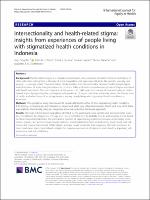Improving equity in health by addressing social determinants
| 2011 | |
| World Health Organization | |
|
This recently published book highlights actions to improve health equity based on findings from the nine global Knowledge Networks that were established during the WHO Commission on Social Determinants of Health. Their task was to synthesize existing evidence and identify effective and appropriate actions to improve health equity in nine thematic areas: - globalization; - gender; - social exclusion; - early child development; - urban settings; - employment conditions; - health systems; - public health programs; and - measurement and evidence. The evidence reinforces the fundamental impact of social determinants on health outcomes and in creating health inequities |
|
| Socioeconomic factors
Health care rationing Health services accessibility Health status disparities Urban health Social change |
|
| book | |
| 319 p. | |
| © World Health Organization 2011 | |
| https://resources.equityinitiative.org/handle/ei/207 |
2011 WHO - Improving Equity in Health by Addressing Social Determinants.pdf
This item appears in the following Collection(s) |
|
|
Collections
|
Related items
Showing items related by title, author, creator and subject.
-
Human resources for health: task shifting to promote basic health service delivery among internally displaced people in ethnic health program service areas in eastern Burma/Myanmar
Low, Sharon; Tun, Kyaw Thura; Mhote, Naw Pue Pue; Htoo, Saw Nay; Maung, Cynthia; Kyaw, Saw Win; Oo, Saw Eh Kalu Shwe; Pocock, Nicola Suyin (2014-09-29)
Background: Burma/Myanmar was controlled by a military regime for over 50 years. Many basic social and protection services have been neglected, specifically in the ethnic areas. Development in these areas was led by the ethnic non-state actors to ensure care and the availability of health services for the communities living in the border ethnic-controlled areas. Political changes in Burma/Myanmar have been ongoing since the end of 2010. Given the ethnic diversity of Burma/Myanmar, many challenges in ensuring health service coverage among all ... -
Can mHealth and eHealth improve management of diabetes and hypertension in a hard-to-reach population? —lessons learned from a process evaluation of digital health to support a peer educator model in Cambodia using the RE-AIM framework
Steinman, Lesley; Pelt, Maurits van; Hen, Heang; Chhea, Chhorvann; Lan, Channe Suy; Te, Vannarath; LoGerfo, James; Fitzpatrick, Annette L. (2020-10-05)
Background: The burden of non-communicable diseases (NCDs) is increasing in low- and middle-income countries (LMICs) where NCDs cause 4:5 deaths, disproportionately affect poorer populations, and carry a large economic burden. Digital interventions can improve NCD management for these hard-to-reach populations with inadequate health systems and high cell-phone coverage; however, there is limited research on whether digital health is reaching this potential. We conducted a process evaluation to understand challenges and successes from a digital ... -
Intersectionality and health-related stigma: insights from experiences of people living with stigmatized health conditions in Indonesia
Rai, Sarju Sing; Peters, Ruth M. H.; Syurina, Elena V.; Irwanto, Irwanto; Naniche, Denise; Zweekhorst, Marjolein B. M. (International Journal for Equity in Health, 2020-12)
Abstract Background Health-related stigma is a complex phenomenon, the experience of which intersects with those of other adversities arising from a diversity of social inequalities and oppressive identities like gender, sexuality, and poverty – a concept called “intersectionality”. Understanding this intersectionality between health-related stigma and other forms of social marginalization can provide a fuller and more comprehensive picture of stigma associated with health conditions. The main objective ...



